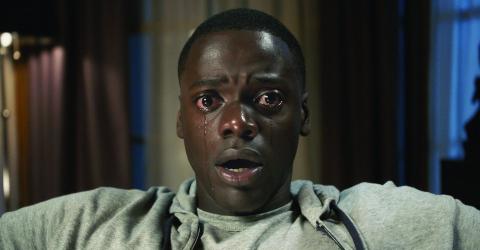When I’m bored at work, waiting in line, or procrastinating from numerous deadlines, I usually scroll through Twitter to see what folks have to say about the day’s events. And June 8th gave me some pretty noteworthy material, much to the chagrin of my co-worker. In the weeks following the murder of George Floyd and the reignition of anti-racist protests, American House Democrats displayed their astute tone-deafness by donning Ghanaian kente cloths during their introduction of soft legislation to address the country’s rampant police violence perpetrated against African Americans (a full line in performative nonsense bingo). Twitter had a field day with yet another display of performative allyship by the Democratic party, but my favorite tweet was a photo-shopped image from Jordan Peele’s Get Out—a perfect metaphor for a Democratic party that vocally supports racial justice but whose legislation throughout the past 30 years have been a detriment to the African American community (See Figure 1 and 2).

(Figure 1: Performative Nonsense, https://www.buzzfeednews.com/article/shannonkeating/democrats-kente-cloth-pelosi-cuomo-bowser-black-lives-matter)

(Figure 2: A Fabulous Photoshop, https://twitter.com/Travonne/status/1270076636113760256)
It is rare for a film to take a perfect temperature of a cultural/political moment but Get Out has done just that in contrasting superficial anti-racist discourse with contributing towards Black oppression—the embodiment of a contemporary liberal discourse that is vocally outraged by social injustice but whose policies helped create that injustice in the first place (War on Drugs, lack of social securities, gentrification, etc.). Released to much fanfare in 2017, Peele's film follows the Black Chris Washington as he meets the family and friends of his White girlfriend, Rose Armitage, at her parent's secluded mansion. While her family and friends seem well-meaning, if not a little racially insensitive, Chris slowly realizes that the community kidnaps, sells, and enslaves African Americans through a revolutionary brain transplant surgery Rose's father, Dean, developed. Through the operation, Dean inserts his patient's brain into a Black body so they can enjoy both a longer lifespan and the bodily features of Blackness his cohort deem desirable. Upon realizing the family's ruse, the film follows Chris's violent attempt to escape becoming a modern slave at the Armitage estate.
While Peele exhibits a mastery of horror—remanent of Ira Levin’s famous novel, The Stepford Wives—Get Out's genius comes from its critique rather than solely its quality. Peele centers the film around Chris's escape, but the Armitage family is crucial to Get Out's display of anti-racist discourse. Rose and her parents embody the white, wealthy liberals who vocally express their lack of prejudice. Dean makes sure to tell Chris that he "would have voted for Obama a third time" if he could and tries to connect with him—albeit awkwardly—to project his comfortability with his daughter dating a Black man. Rose herself is aware of her parent's racial insensitivity, as she mocks their attempts to appeal to Chris, and of Black injustice in general, shown when she confronts an officer who asks for Chris's driver's license as he sat in the passenger seat. Although not perfect, the Armitage's appear to be unprejudiced towards Chris.
This vocal veneer falls apart once Chris discovers they plan to kidnap him and remove his brain, but the juxtaposition between the Armitage’s anti-racist discourse and their fundamentally racist actions are at the heart of Peele’s narrative. Their experiment in abducting African Americans and using their bodies for personal conduits is a spin on antebellum slavery—a subversion of using Black bodies against their will for both economic and personal gain. It does not matter that the Armitage's are vocally anti-racist since they participate in their own version of a community slave-trade. In contrasting vocal support and actions, Peele underscores how discourse does not equal behavior—that kind words and slogans do not hide acts of oppression and discrimination.
The photo-shopped image I began this piece with showcases how Get Out is a film about empty gestures, which is commonplace in contemporary discussions of racism. Talk is cheap in the world of anti-racism, but too many people in power, some of whom benefit, in part, from underlying inequalities, have social justice message paired with ineffective responses to correct systemic and institutional racism. That bit of critique might be the most genius aspect of Peele's film. Get Out is a trojan horse of sorts—an anti-racist narrative that appeals to left-leaning audiences who support social justice that then confronts them with their superficial faults. Get Out is a film for a certain kind of audience. It is for all the BLM signs hanging in windows of gentrified neighborhoods, where Black people were priced out and/or evicted to make room for wealthier tenants. It is a film for the social liberals but economic conservatives, in a world where economic policies determine the social and not the other way around. It is a film for all those liberal representatives, mayors, and councilmembers who kneeled in the memory of George Floyd but scoffed at the demands by protestors and activists enraged by his demise. Get Out challenges, rather than panders to, the very ideologies it attracts the most.
For all these reasons, Get Out is an excellent example of a challenging anti-racist film. Peele’s narrative has depth, originality, and subverts anti-racist tropes—like racial reconciliation and vocal denouncements of racism—by presenting the underbelly of performative allyship. In having substance and taking some serious, yet rewarding, risks in its critique, Jordan Peele’s Get Out proves itself as one of the best anti-racist films to date.
Score: 5/5
